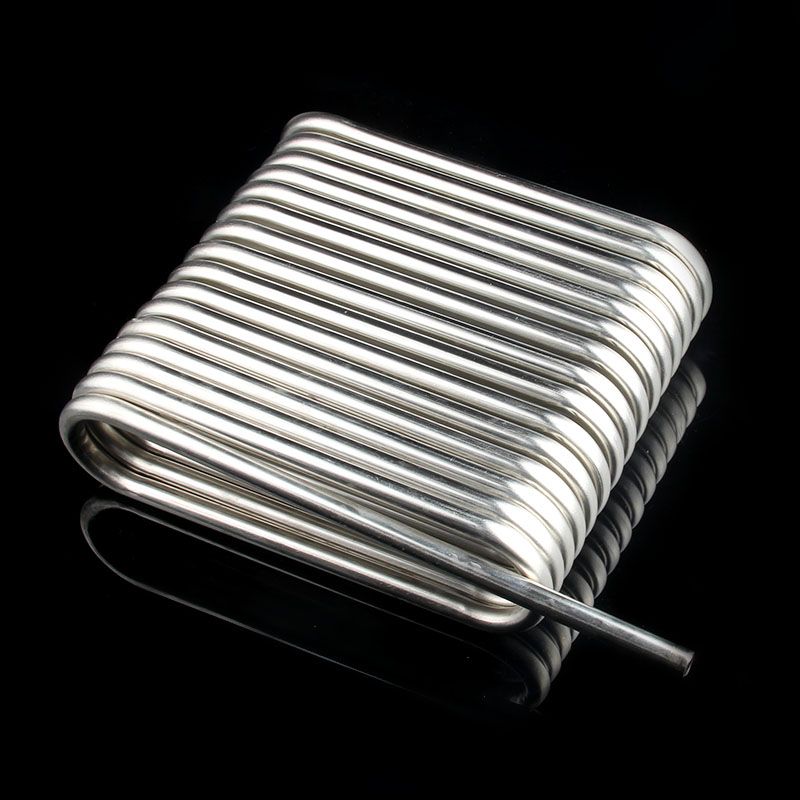Table of Contents

What Is a Stainless Steel Coil Tube?
A stainless steel coil tube is a continuous coiled tube made from precision-slit stainless steel strip, then formed and welded into a seamless structure.
It is widely used in heat exchangers, condensers, chemical processing systems, and fluid transport applications.
This material stands out for its ability to perform in high-temperature, high-pressure, and corrosive environments.
The most commonly used grades are 304, 304L, and 316L, each offering different levels of corrosion resistance and formability.
Main advantages include:
- Excellent corrosion resistance – especially 316L, which contains molybdenum for superior acid and chloride protection.
- Long service life with low maintenance – ideal for harsh environments such as offshore or chemical plants.
- Customizable dimensions – typically in the range of 0.30–1.50 mm thickness and 20–100 mm width, suitable for a variety of heat exchanger designs.
Manufacturing Process: From Mother Coil to Precision Slit Strip
(1) Primary Slitting – 4-Foot Slitting Line
The process begins with a 1250 mm stainless steel mother coil, which is slit into 400 mm intermediate coils using a 4-foot slitting machine.
This stage demands precise blade alignment and consistent tension control to ensure clean edges and minimal burr formation, providing a stable base for further processing.
(2) Secondary Slitting – 650 mm Slitting Line
Next, the intermediate coils undergo secondary slitting on a 650 mm slitting line, reducing the width further to the customer’s required size — typically 20–100 mm.
Genn-Hann Stainless Steel employs dual-knife servo systems and tension compensation controls, achieving width tolerance within ±0.05 mm.
This precision is crucial for maintaining uniform flow and heat transfer performance in the final heat exchanger tubes.
(3) Surface Protection and Film Application
During slitting, the strips are coated with PVC or PE protective film on both sides to prevent scratches during handling and tube forming, ensuring a smooth surface finish and consistent thermal performance.
(4) Tube Forming and Welding
The slit strip is then formed into a circular shape and welded using TIG or laser welding.
Strict control of the weld seam’s smoothness and airtightness ensures that the tubes remain leak-free under high pressure — a key requirement for heat exchanger applications.
(5) Quality Inspection
Each batch undergoes thickness, width, hardness, surface roughness, and material composition checks.
All products comply with ISO 9001 certification and TOYOTA factory quality standards, guaranteeing zero defects and full traceability.
Material Overview: Comparison of 304, 304L, and 316L Grades
Grade | Key Characteristics | Corrosion Resistance | Typical Applications |
304 | Contains 18% Cr and 8% Ni; general-purpose alloy | Excellent corrosion resistance | Food equipment, decorative parts |
304L | Low-carbon version of 304; improved weld resistance | Ideal for welded structures | Chemical tanks, heat exchangers |
316L | Contains 2–3% Mo; superior acid and chloride resistance | Excellent for aggressive environments | Marine, chemical, energy industries |
All Genn-Hann coil tubes conform to ASTM A240/A480 and JIS 4305 standards, available in 0.30–1.50 mm thickness and 20–100 mm width.
Precision Slitting: The Hidden Driver of Heat Exchanger Efficiency
In heat exchanger production, width accuracy is critical. Even a small variation can affect the weld alignment, fluid flow uniformity, and heat transfer efficiency.
Genn-Hann’s servo-driven dual-knife and automatic tension systems ensure dimensional precision and smooth edges.
Combined with a comprehensive ERP tracking system, every coil’s origin, batch, and processing data are traceable — ensuring consistent quality and accountability.
This precision manufacturing capability is one of the key reasons why global heat exchanger manufacturers trust Genn-Hann as their coil tube supplier.
Applications Across Industries
- Energy Sector: 316L coil tubes are used in condensers, turbines, and heat recovery systems.
- Chemical Processing: 304L tubes provide excellent resistance to acids and alkalis, used in distillation columns and reactors.
- Food & Beverage: 304 stainless steel ensures hygiene in pasteurization and cooling systems.
- Semiconductor & Electronics: Ultra-clean 316L tubes are used for high-purity gas transfer systems.
Genn-Hann Stainless Steel: Manufacturing Advantages
- Over 40 years of experience – Established in 1980, specializing in stainless steel slitting, shearing, and polishing.
- Comprehensive equipment lineup – 4-foot, 5-foot, 650 mm, and 400 mm precision slitting lines covering 0.10–6.00 mm thickness range.
- International certifications – ISO 9001 and TOYOTA factory certification for strict quality assurance.
- Fast delivery – Large inventory, efficient ERP scheduling, and multiple shipping options (truck, sea, air).
- Custom solutions – Tailor-made widths, grades, and surface finishes to match client specifications.
Quality Assurance and Testing Procedures
- Dimensional checks before and after processing (thickness & width).
- Hardness and surface roughness tests for consistent mechanical performance.
- Visual and image-based inspections to eliminate defects.
- Third-party verifications available (SGS,or TUV reports upon request).
Genn-Hann’s strict quality control ensures that every coil tube meets the most demanding international standards for heat exchanger production.
Conclusion: Precision Slitting for Superior Thermal Performance
The stainless steel coil tube is not just a structural component — it’s the foundation of efficient heat transfer.
Genn-Hann Stainless Steel’s expertise in high-precision slitting and surface control ensures optimal tube uniformity and performance in every application.
“Crafting precision, creating excellence — Genn-Hann Stainless Steel.”
FAQ
Q1: What are the most common materials used for stainless steel coil tubes?
A1: The primary materials are 304, 304L, and 316L. Among them, 316L offers the best resistance to acid and chloride corrosion.
Q2: What thickness and width ranges can Genn-Hann provide?
A2: The coil tube strip thickness ranges from 0.30 to 1.50 mm, and widths from 20 to 100 mm, customizable based on client needs.
Q3: How does Genn-Hann ensure slitting accuracy?
A3: With servo-driven dual-knife systems and automatic tension control, Genn-Hann achieves width tolerance within ±0.05 mm.
Q4: What’s the difference between 304 and 316L coil tubes?
A4: 304 is suitable for general use, while 316L contains molybdenum for superior corrosion resistance in marine and chemical environments.
Q5: Are Genn-Hann products certified?
A5: Yes. All coil tubes are manufactured under ISO 9001 certification and meet TOYOTA factory quality standards.